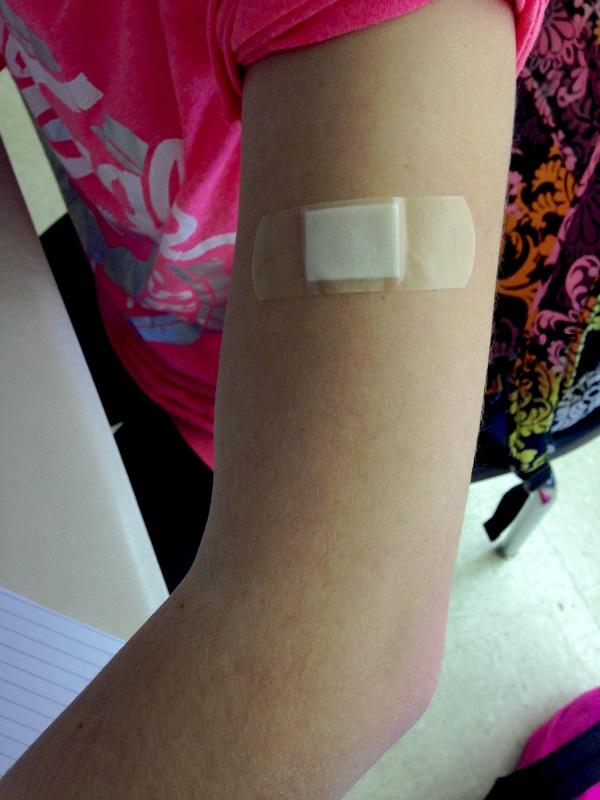The importance of immunizations (Editorial)
Getting a vaccine goes a long way towards eliminating deadly diseases.
Vaccines are designed to fight against diseases, making the person immunized from getting those diseases in the future. Many 21st-century parents, however, have decided not to give their children vaccines because they don’t like the idea of putting chemicals their children’s bodies, or they believe they cause autism.
I strongly disagree with this opinion. Immunizations are extremely helpful and all children that can get them should.
“Vaccines reduce the risk of infection by working with the body’s natural defenses to help it safely develop immunity to disease,” according to the Center of Disease Control and Prevention.
If people chose not to vaccinate their kids, they aren’t only hurting them, but as well as those around them.
Also, those that believe that vaccines can cause autism should be aware that there is strong evidence against this suspicion.
According to the Institute of Medicine, “This eighth and final report of the Immunization Safety Review Committee examines the hypothesis that vaccines, specifically the measles-mumps-rubella (MMR) vaccine and thimerosal-containing vaccines, are causally associated with autism.”
They conclude that “the body of epidemiological evidence favors rejection of a causal relationship between the MMR vaccine and autism.” In other words, the idea that vaccines cause autism is false.
Recently, one mother, Jennifer Hibben-White, brought her 15 day old son to the doctors for a weigh-in appointment. A few days later she received a phone call from the hospital, informing her that her son may have been exposed to the measles virus. How could this have been possible? He was not even a month old.
Apparently, someone in the Toronto-area waiting room had not been vaccinated against this virus, exposing her son to it.
Hibben-White turned to Facebook to share her frustrations.
“If you have chosen not to vaccinate yourself or your child, I blame you,” said Hibben-White.
I agree with her. That women’s son was 15 days old, obviously too young to receive a vaccination and he was exposed to a disease that we have an ability to prevent.
We all rely on each other to keep healthy, and vaccines help protect us from diseases.
Hibben-White, who previously lost her 5-year old daughter due to a incurable illness, ended her argument by saying, “You would be the first to line up if you had an inkling of what the death of a child feels like. You would be crawling through the streets on your hands and knees, begging, BEGGING to get that vaccine into your precious babies because that is what I would have done, if I could, to save my daughter. The fact is, there was no vaccine for her. Not for her illness. And she died. She died at age five and a half, and she is gone.”
I strongly believe that people should be vaccinated if they are able to. We need vaccinations for one simple reason. They keep us healthy and are proven to protect us from harmful diseases. A child who can’t be vaccinated due to other illnesses depends on you to get vaccinated for them. If they get sick, the chances of them living through it are slim.
If you are not up to date on your immunizations, get them! You aren’t just helping yourself. You are helping those around you too.
Disclaimer: Articles designated as “Editorial” represent the views and opinions of the author, not the 2014-2015 Periscope staff, CHS Administration, or the CHS student body.
Want to help the Herd? Please consider supporting the Periscope program. Your donation will support the student journalists of CHS and allow us to purchase equipment, send students to workshops/camps, and cover our annual website hosting costs.

Lauren Pantleo is in 10th grade. Her staff position on Periscope is Perspective Writer. She does track and was a competitive swimmer. Lauren enjoys music...





























































































Caroline • Aug 12, 2015 at 2:09 pm
I totally agree with Lauren! Immunizations are so important for everyone. We all need to stay up to date on our shots, not only for ourselves, our families and for society but for those who are too young to be immunized and those who for medical reasons, can’t be. My parents made sure I was fully immunized and I make sure myself and my daughter are fully immunized. Keep up the good work Lauren!
Keyarrha Carter • Apr 7, 2015 at 8:15 am
I completely agree vaccines are very important in keeping society protected from harmful diseases. Parents that choose not to vaccinate their children, are not only hurting their children but everyone around them, it has an effect on the entire society. It takes all of us and we must work together to prevent diseases from spreading. There is also no scientific support that vaccines cause autism.
Sofie Praestgaard • Mar 25, 2015 at 5:25 pm
This is extremely important. Babies have died recently from measles because of people who refuse to receive immunizations! That is unacceptable. Laruen did a very nice job of using credible and convincing sources. I feel like if someone who doesn’t believe in vaccinations read this article, they would have a changed opinion for sure. We can’t rely on studies that are not very credible, we have to (as a society) help others AND ourselves by getting our children vaccinated
Ryan Doody • Mar 24, 2015 at 9:14 am
The article said everything that needed to be said. I like how Lauren cited academic sources like the CDC and more emotional sources like a mom whose kid died because someone else didn’t vaccinate. Parents should not have the right to decide whether or not to vaccinate diseases that used to be pandemics. The reason people do not feel the need is because those diseases no longer kill as many people as they used to because people started getting vaccinations. It’s like they don’t care about anyone else.
Rachel Day • Mar 12, 2015 at 11:52 am
I totally agree. Vaccines are able to save lives and we should be thankful that this kind of healthcare is available to us. I think that people who refuse vaccinations for their children are only putting them at a greater risk, as well as putting other children at risk that have been immunized. I believe it is unfair to everyone that has been immunized when they have to be around people that choose to make themselves susceptible to preventable diseases.
Madelynne Staley • Feb 26, 2015 at 8:43 am
I completely agree with this article! I think it is very important to get vaccinated not only for yourself, but for others as well. As someone with young family members, I worry about them getting these diseases before they are old enough to get vaccinated, and babies certainly should not have to pay for the ignorance of others who don’t understand the science behind immunizations, or for those who just don’t care. We live in an area that is privileged enough to offer life-saving vaccinations to us, and I think that it is wrong to take advantage of this fact while putting others at risk.